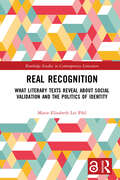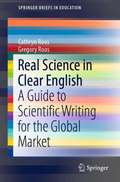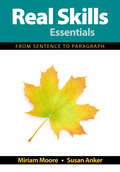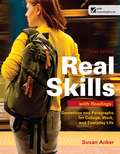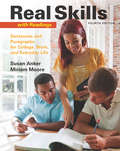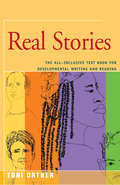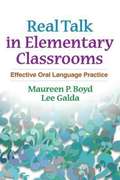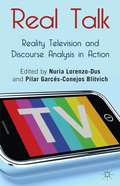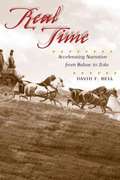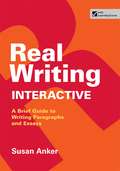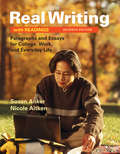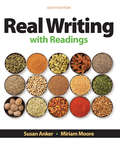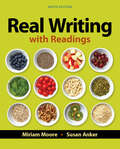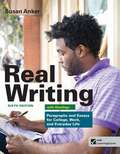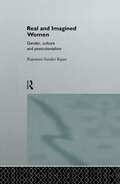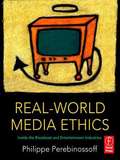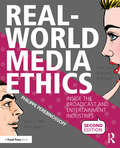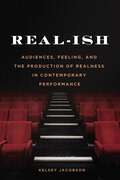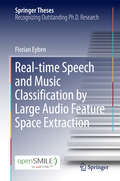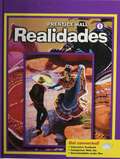- Table View
- List View
Real Recognition: What Literary Texts Reveal about Social Validation and the Politics of Identity (Routledge Studies in Contemporary Literature)
by Marie-Elisabeth Lei PihlReal Recognition investigates the complexities of literary and social recognition with the aim of putting a fresh, cross-disciplinary spin on reader identification and social acknowledgment. Engaging with contemporary Danish and Anglophone works on racialization, disability, and gender, Marie-Elisabeth Lei Pihl argues in favor of a close relation between aesthetic appeals to recognition and the political dimensions of literary texts. Moreover, she proposes a framework bent on experience and relations, as opposed to identity and status, for articulating new fruitful understandings of how literary texts call for aesthetic and social recognition. Based on this, she argues that literary texts can make readers get what social validation is about – and thereby help us redefine a key concept in the social sciences. Marie-Elisabeth Lei Pihl earned her PhD in literature and sociology from the University of Southern Denmark in 2020. Currently, she works as a postdoctoral researcher within narrative medicine and literature-based social interventions at the University of Southern Denmark in collaboration with the National Institute of Public Health in Copenhagen. Chapter 3 of this book is available for free in PDF format as Open Access from the individual product page at www.routledge.com. It has been made available under a Creative Commons Attribution-Non Commercial-No Derivatives 4.0 license.
Real Recognition: What Literary Texts Reveal about Social Validation and the Politics of Identity (Routledge Studies in Contemporary Literature)
by Marie-Elisabeth Lei PihlReal Recognition investigates the complexities of literary and social recognition with the aim of putting a fresh, cross-disciplinary spin on reader identification and social acknowledgment. Engaging with contemporary Danish and Anglophone works on racialization, disability, and gender, Marie-Elisabeth Lei Pihl argues in favor of a close relation between aesthetic appeals to recognition and the political dimensions of literary texts. Moreover, she proposes a framework bent on experience and relations, as opposed to identity and status, for articulating new fruitful understandings of how literary texts call for aesthetic and social recognition. Based on this, she argues that literary texts can make readers get what social validation is about – and thereby help us redefine a key concept in the social sciences.Marie-Elisabeth Lei Pihl earned her PhD in literature and sociology from the University of Southern Denmark in 2020. Currently, she works as a postdoctoral researcher within narrative medicine and literature-based social interventions at the University of Southern Denmark in collaboration with the National Institute of Public Health in Copenhagen.Chapter 3 of this book is available for free in PDF format as Open Access from the individual product page at www.routledge.com. It has been made available under a Creative Commons Attribution-Non Commercial-No Derivatives 4.0 license.
Real Science in Clear English: A Guide to Scientific Writing for the Global Market (SpringerBriefs in Education)
by Cathryn Roos Gregory RoosThis book is a timely go-to resource for any professionals wishing to communicate with the growing number of readers whose first language is not English. It highlights the potential language difficulties these readers face, and provides guidelines and tools for overcoming them. The guidelines show how to convey complicated information clearly without affecting the integrity of the subject matter, while the practical ‘before’ and ‘after’ examples clearly illustrate how using these guidelines and improves scientific texts. The book also includes text evaluation tools that allow writers to rapidly assess the readability of their materials. It is based on theory and the authors’ extensive experience in producing highly readable English texts for L2 readers who struggle with materials that were originally prepared for L1 readers.
Real Skills Essentials: From Sentence to Paragraph
by Susan Anker Miriam MooreWords, and the ways we put them together, help us accomplish ordinary tasks and (as our skills improve) some incredible feats: getting a date, making a sale, convincing the boss to try a new idea, changing a law, or solving a long-standing problem. The words we use to read and write can also help us to think more creatively, more deeply, and more effectively. In Real Skills Essentials, I wanted to help you see the value of skills like reading, thinking, and writing. It takes time and attention to learn new words, understand them when you read, and master rules for combining and punctuating them accurately. But in the end, after working for these skills, you will begin to see them working for you. It will be worth the effort.
Real Skills With Readings: Sentences and Paragraphs for College, Work, and Everyday Life
by Susan AnkerReal Skills with Readings offers practical, accessible coverage of basic sentence skills and step-by-step guidance on writing paragraphs. Like the other books in the Anker series, Real Skills motivates students with its message that writing is an essential and achievable skill. Real Skills connects engaging grammar and writing instruction with an emphasis on critical thinking and reading skills -- the keys to successful writing. Real-world examples, assignments, and readings show students the relevance of writing to all aspects of their lives. Real Skills with Readings is now integrated with LearningCurve -- online, adaptive quizzing activities that reinforce what students learn in the book.
Real Skills with Readings
by Susan Anker Miriam MooreReal Skills with Readings offers practical, accessible coverage of basic sentence skills and step-by-step guidance for writing paragraphs. Motivating students with its message that writing is an essential and achievable skill, the text uses real-world examples, assignments, and readings to help students relate writing to all aspects of their lives. The fourth edition builds on suggestions from developmental writing instructors across the country. Streamlined with a new design, the text features even more emphasis on critical thinking and reading skills, with new guided reading support in every chapter and more samples by real student writers. Additional skill-specific practice is available by packaging Real Skills with LaunchPad Solo for Readers and Writers, our newest set of online multimedia content and assessments, including LearningCurve adaptive quizzing. Use ISBN 1319051928 to order Real Skills with Readings and LaunchPad Solo for Readers and Writers.
Real Stories: The All-Inclusive Textbook for Developmental Writing and Reading
by Toni OrtnerReal Stories is writing and reading text that works. The method is classroom-tested and designed to meet the needs of multi-cultural high school students. It contains three sections: The Process of Writing covers the basic building blocks of writing. Time Savers for Grammar and Punctuation includes types of sentences, how to find and eliminate runs-ons, comma splices and fragments, comma use, nouns, capitalization, direct quotes, verb tenses, and irregular verbs, practice exercises, an answer key, and tests. The Reader contains students' personal stories for analysis and discussion. Real Stories helps students use words to empower and enrich their lives.
Real Talk in Elementary Classrooms
by Lee Galda Maureen BoydDescribing effective, creative strategies for talking with students in ways that enhance literacy learning, this book offers a window into the classrooms of four exemplary teachers. Principles of productive classroom discussions are illustrated with detailed case examples. The book shows how-and explains why-"real talk" can enhance student engagement, foster critical thinking, promote mastery of literacy concepts, and instill a lasting love of reading. It offers ideas for selecting children's literature and fitting a range of interactive literacy activities into the school day. The authors draw on current knowledge about the connections between oral language and literacy development across the elementary grades.
Real Talk: Reality Television and Discourse Analysis in Action
by Nuria Lorenzo-Dus Pilar Garcés-Conejos BlitvichThis is the first book to examine the discourse of reality television. Chapters provide rigorous case studies of the discourse practices that characterise a wide range of generic and linguistic/cultural contexts, including dating shows in China and Spain, docudramas in Argentina and New Zealand, and talent shows in the UK and USA.
Real Time: Accelerating Narrative from Balzac to Zola
by David F. BellIn Real Time David F. Bell explores the decisive impact the accelerated movement of people and information had on the fictions of four giants of French realism--Balzac, Stendhal, Dumas, and Zola. Nineteenth-century technological advances radically altered the infrastructure of France, changing the ways ordinary citizens--and literary characters--viewed time, space, distance, and speed. The most influential of these advances included the improvement of the stagecoach, the growth of road and canal networks leading to the advent of the railway, and the increasing use of mail, and of the optical telegraph. Citing examples from a wide range of novels and stories, Bell demonstrates the numerous ways in which these trends of acceleration became not just literary devices and themes but also structuring principles of the novels themselves. Beginning with both the provincial and the Parisian communications networks of Balzac, Bell proceeds to discuss the roles of horses and optical telegraphs in Stendhal and the importance of domination of communication channels to the characters of Dumas, whose Count of Monte-Cristo might be seen as the ultimate fictional master of this accelerated culture. Finally, Bell analyzes the cinematic vision created by the arrival of the railroad, as depicted by Zola in La Bète Humaine.
Real Toads, Imaginary Gardens: On Reading and Writing Poetry Forensically
by Paisley RekdalAn innovative and accessible guide to writing and reading poetry by an acclaimed poet and beloved professor of poetry. What makes reading a poem unlike reading anything else? In Real Toads, Imaginary Gardens, acclaimed poet and teacher Paisley Rekdal demonstrates how to observe the building blocks of a poem—including its diction, form, imagery, and rhythm—and construct an interpretation of its meaning. Using guided close readings and nearly 40 creative and critical “experiments,” this book shows how a poem takes shape through the intersection of all its lyric elements. Drawing on the work of poets from William Shakespeare to Jericho Brown, Real Toads, Imaginary Gardens reveals how to read and write critically, and how to appreciate—and achieve—the exhilarating craft of poetry.
Real Writing Interactive
by Susan AnkerReal Writing Interactive offers practical coverage of writing skills and step-by-step guidance on crafting paragraphs and essays in a brief, interactive, and affordable format. The print component offers the essentials of Anker's accessible writing instruction along with select exercises; additional exercises are available online in LearningCurve, adaptive, game-like quizzing that helps students focus on the material they most need help with. As with all books in the Anker series, Real Writing Interactive motivates students with its message that writing is an essential and achievable skill and encourages students to connect what they learn with their own goals and with the needs and expectations of the larger world.
Real Writing with Readings
by Susan Anker Nicole AitkenReal Writing delivers a powerful message to students: Good writing skills are both attainable and essential. Concise "Four Basics" boxes and engaging paragraph- and essay-writing chapters present the writing process in clear, easy-to-follow steps. Readings that resonate with students' everyday lives are threaded throughout, with examples ranging from student papers to workplace writing and professional essays. The Four Most Serious Errors and other sentence-level chapters cover grammar in a lively and supportive way, with plenty of opportunities for practice and application. As always, Susan Anker encourages students to connect what they learn with their own goals and with the needs and expectations of the larger world. With this new edition, we asked users to recommend writing samples and candidates for Profiles in Success, a feature that highlights former students in a variety of professions and how they use writing in their jobs, and the resulting book illustrates the diversity of the students and instructors who have been using the book for years.
Real Writing with Readings: Paragraphs And Essays For College, Work, And Everyday Life
by Susan Anker Miriam MooreReal Writing with Reading Book is very useful for writing Paragraphs and Essays for College, Work, and Everyday Life It will help you how to write different kinds of paragraphs and essays, grammar concerns, word use, punctuation and capitalization and many other tips for writing
Real Writing with Readings: Paragraphs and Essays for College, Work, and Everyday Life
by Susan Anker Miriam MooreReal Writing with Readings delivers a powerful message to students: Good writing skills are both attainable and essential. Concise “Four Basics” boxes, together with mode-specific graphic organizers, “Paragraphs versus Essays” graphics, and engaging paragraph- and essay-writing chapters, present the writing process both visually and in words as a clear, easy-to-follow process. The “Four Building Blocks of Effective Sentences” (Chapter 16) and other sentence-level chapters cover grammar in a lively and supportive way, with plenty of opportunities for practice and application. And now, Achieve with Real Writing puts student writing at the center of your course and keeps revision at the core, with a dedicated composition space that guides students through drafting, peer review, source check, reflection, and revision. Achieve is a flexible, integrated suite of tools for designing and facilitating writing assignments, all in a single powerful, easy-to-use platform that works for face-to-face, remote, and hybrid learning scenarios. Fully editable pre-built assignments support the book’s approach and an e-book is included.
Real Writing with Readings: Paragraphs and Essays for College, Work, and Everyday Life
by Susan AnkerWith efficient and engaging instruction and a consistent focus on why writing matters in the real world, Real Writing delivers a powerful message to students: Good writing skills are both achievable and essential. Concise Four Basics boxes and engaging paragraph- and essay-writing chapters present writing instruction in clear, manageable increments. The Four Most Serious Errors and other sentence-level chapters cover grammar in a lively and supportive way, with abundant opportunities for practice and application. As always, Susan Anker encourages students to connect what they learn with their own goals and with the needs and expectations of the larger world. In Profiles of Success, former students, now employed in a variety of professions, speak frankly about their experiences in school and after graduation, with examples of the types of writing their current jobs require. In this edition, Anker does far more to build students' critical thinking, critical reading, and argument skills and adds innovative new assignments, readings, and visuals.
Real and Imagined Women: Gender, Culture and Postcolonialism
by Rajeswari Sunder RajanAn essential addition to the postcolonial debate which offers a challenging mode of `reading resistance' which destroys the stereotyped and sensationalised humanist image of the `third world woman' as victim.
Real-World Media Ethics: Inside the Broadcast and Entertainment Industries
by Philippe PerebinossoffThe Los Angeles Times recently reported that the word "integrity" was the most looked up word on Merriam-Webster's online dictionary, suggesting that people are looking for guidance in a scandal-driven world. Issues of ethics and the media continue to dominate our awareness and present real challenges in our day-to-day work. This book shows the ethical decision-making process in action using tools of critical analysis and evaluation. Real-World Media Ethics is written in a friendly and approachable voice. It succeeds in offering an honest, frontline-aware and realistic sense of the ethical situations faced by entertainment and journalism professionals every day-in the real world. Most of the other books about media ethics focus mostly on journalism; this book, however, covers not just journalistic ethics but also ethics in the landscape of mass media, including public relations, the entertainment industry, and other forms of visual communication. The author includes numerous case studies about current headlines that readers will already be familiar with, providing realistic and engaging scenarios about when, how, and why ethics count.
Real-World Media Ethics: Inside the Broadcast and Entertainment Industries
by Philippe PerebinossoffIs it ethical to pass yourself off as black if you are Caucasian, as Rachel Dolezai, the president of a local chapter of the NAACP, did in 2015? Was it ethical for Donald Sterling, the former owner of the NBA team, to use racially inflammatory language? Is it ethical to exaggerate or fabricate the importance of one’s role, as Brian Williams apparently did when he anchored the NBC nightly news? Is it ethical for a journalist to pay a source for a story, tips, and photos, as TMZ, Gawker and others do regularly? The above questions as well as other questions definitely illustrate the need for studying ethics. Real-World Media Ethics provides a wide showcase of real ethical issues faced by professionals in the media field. Numerous case studies allow readers to explore multiple perspectives while using realistic ethical principles. This book includes the basics in ethical journalism, as well as the tools to navigate through the landscape of mass media such as public relations, entertainment and other forms of visual communication. The second edition has been updated to encompass globalization, new media platforms, current copyright issues, net neutrality, sports ethics, and more. An accompanying companion website provides additional interviews demonstrating ethical principles in practice. Being a former ABC executive, author Philippe Perebinossoff gives readers an inside look at circumstances with an ethical, experienced eye.
Real-ish: Audiences, Feeling, and the Production of Realness in Contemporary Performance
by Kelsey JacobsonIn the “post-truth” era, the question of how people perceive things to be real, even when they are not based in fact, preoccupies us. Lessons learned in the theatre – about how emotion and affect produce an experience of realness – are more relevant than ever.Real-ish draws on extensive interviews with audience members about their perceptions of realness in documentary, participatory, historical, and immersive performances. In studying these forms that make up the theatre of the real, Kelsey Jacobson considers how theatrical experiences of realness not only exist as a product of their real-world source material but can also unfurl as real products in their own right. Using the concept of real-ish-ness – which captures the complex feeling that is generated by engaging with elements of reality – the book examines how audiences experience the apparently real within the time and space of a performance, and how it is closely tied to the immediacy and intimacy experienced in relation to others.When feeling – rather than fact –becomes a way of knowing truths about the world, understanding the cultivation and circulation of such feelings of realness is paramount. In exploring this process, Real-ish centres audience voices and, perhaps most importantly, audience feelings during performance.
Real-time Speech and Music Classification by Large Audio Feature Space Extraction
by Florian EybenThis book reports on an outstanding thesis thathas significantly advanced the state-of-the-art in the automated analysis andclassification of speech and music. Itdefines several standard acoustic parameter sets and describes theirimplementation in a novel, open-source, audio analysis framework calledopenSMILE, which has been accepted and intensively used worldwide. The bookoffers extensive descriptions of key methods for the automatic classificationof speech and music signals in real-life conditions and reports on theevaluation of the framework developed and the acoustic parameter sets that wereselected. It is not only intended as a manual for openSMILE users, but also andprimarily as a guide and source of inspiration for students and scientists involvedin the design of speech and music analysis methods that can robustly handlereal-life conditions.
Realidades 1
by Peggy Palo Boyles Myriam Met Richard S. Sayers Carol Eubanks WarginNIMAC-sourced textbook
Realidades 1
by Peggy Palo Boyles Myriam Met Richard S. Sayers Carol Eubanks WarginNIMAC-sourced textbook
Realidades 1
by Peggy Palo Boyles Myriam Met Richard S. Sayers Carol Eubanks WarginNIMAC-sourced textbook
Realidades 2
by Peggy Palo Boyles Myriam Met Richard S. Sayers Carol Eubanks WarginNIMAC-sourced textbook
